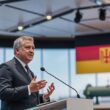The Hungarian Prime Minister Viktor Orbán received a notably warm reception at the White House on Friday, a gesture that has drawn scrutiny regarding the evolving dynamics between the United States and Central Europe. Instead of the customary Oval Office meeting, the obligatory press conference was held at a formal dining table, suggesting a more intimate and extended discussion centered around a shared lunch between Orbán and President Trump.
Trump indicated that the agenda would include discussions on trade, Russia and Ukraine and energy prices, a range of topics that highlight areas of potential strategic alignment and divergence. Significantly, the American President used the occasion to deliver extended messages targeted at his domestic electorate, highlighting perceived economic successes within the US, particularly the affordability of Thanksgiving. This strategic deployment of the foreign meeting to bolster domestic messaging underscores the performative nature of such diplomatic encounters.
Orbán, for his part, leveraged the platform to critique what he termed the European Union’s “absurd” migration policies, claiming exorbitant daily penalties levied on Hungary for preventing migration. Trump’s understanding smile during this statement signaled a tacit endorsement of Orbán’s stance, further complicating the US’s traditionally balanced approach to European affairs. Orbán’s portrayal of Hungary as the sole “Christian government” in Europe, an “island” diverging from other EU member states, reinforced his nationalist and conservative political agenda, potentially alienating more moderate voices within the transatlantic alliance.
The visit appears heavily influenced by Hungary’s continued dependence on Russian energy supplies, particularly in light of US sanctions against Russian oil. Analysts suggest Orbán likely sought a special exemption from these sanctions during his deliberations with Trump, a move that could be perceived as undermining US policy objectives and signaling a softening of the US stance on Russian energy dependence. Beyond ceremonial pleasantries, Orbán’s visit marks an attempt to forge a “new chapter” in US-Hungarian relations, a project carrying significant geopolitical implications around Europe’s energy landscape, the future of the EU’s relationship with Russia and the broader contours of transatlantic partnership under an increasingly populist world order.





